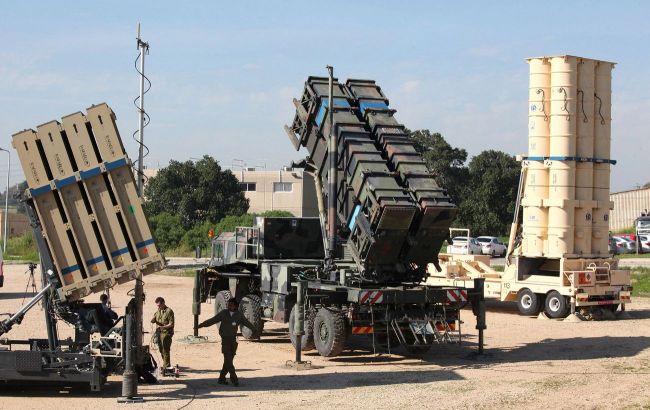Will Ukraine receive Israeli Patriots? Media coverage and potential obstacles
 Photo: Western media report on a possible deal to transfer Israeli Patriot jets to Ukraine (Getty Images)
Photo: Western media report on a possible deal to transfer Israeli Patriot jets to Ukraine (Getty Images)
Ukraine, with the assistance of the United States, is possibly preparing another agreement to enhance its air defense. The idea of acquiring Israeli Patriot systems is being discussed, as confirmed by sources to RBC-Ukraine.
Further details about the deal, the quantity of Patriots, and potential obstacles are discussed in the material below.
Contents
- Who is negotiating and when will the decision be made
- What type and how many Patriots Israel has
- Potential obstacles to the transfer of Israeli Patriots
Who is negotiating and when will the decision be made
As RBC-Ukraine has learned, last week Defense Minister Rustem Umerov discussed the transfer of Patriot systems with his Israeli counterpart Yoav Galant. The deal involves the participation of the United States, which must first purchase them.
"The decision has not been made yet, but it will be made very soon," said a source in the Israeli Defense Ministry.
Some details are provided by the Financial Times. According to it, ministers and high-ranking officials of the three countries are outlining the contours of the deal.
The three interlocutors speaking anonymously said that Ukrainian Foreign Minister Dmytro Kuleba raised the issue in conversations with US Secretary of State Antony Blinken. Moreover, US National Security Advisor Jake Sullivan discussed it with Presidential Office Head Andriy Yermak at least twice.
“Ukraine continues to work with various countries around the world on obtaining additional Patriot systems. We once again call on all countries that have such systems to provide them to Ukraine,” Kuleba told the Financial Times.
RBC-Ukraine contacted the Ukrainian Ministry of Defense to confirm or refute the negotiations. The press service responded with the statement, "Patriots love silence."
It should be noted that Israel previously assisted exclusively through non-lethal means: humanitarian aid, field hospitals, an air attack warning system for Kyiv, etc. This was explained by the need to balance between Ukraine and Russia, especially given Moscow's influence in Syria, where Israeli aircraft often operate against Iranian proxies. However, the US administration is trying to convince Benjamin Netanyahu's government that it is time to respond to Russia's rapprochement with Iran.
What type and how many Patriots Israel has
At the moment, the supply of 8 Patriot batteries is being discussed. However, even if the deal proceeds, it's uncertain whether all of them will be sent to Ukraine.
Israel announced plans to take out of service all of its 8 batteries back in April. They have been on combat duty for more than 30 years, and they are planned to be replaced by modern Stunner anti-aircraft missile systems (David's Sling).
“It would be fortuitous if these older Patriot missiles were put to good use in another theatre before they aged out,” said Tom Karako, head of the Missile Defense project at the Center for Strategic and International Studies.
Washington annually provides Israel with about $3.8 billion in military support, and in the spring it allocated an additional $14 billion in emergency funds for an ally fighting Hamas. This could be an argument in negotiations on the transfer of the Patriot.
According to The War Zone portal, the Israeli Defense Forces uses eight batteries in the PAC-2 GEM-T version. The systems have undergone local modernization and are known as Yahalom (Hebrew for "diamond").
The designation GEM-T refers to missiles with improved guidance capabilities, developed after upgrading older MIM-104D missiles to better intercept ballistic threats. GEM-T missiles are still being produced, allowing for replenishment from US production lines.
Israeli Patriots are older than those already received by Ukraine but are fully compatible. PAC-2 systems are effective against ballistic missiles and are considered more suitable for intercepting aircraft at longer ranges compared to PAC-3 modifications, which focus primarily on ballistic missile defense.
"The PAC-2 is actually more useful than the PAC-3 for long-range interception of aircraft, so they will certainly be useful in Ukraine," the FT quoted Justin Bronk, a senior researcher at the Royal Joint Institute for Defense Studies in London.
Oleksandr Kovalenko, a military and political observer at the Information Resistance group, does not rule out that the news about Israeli systems came as Western partners are trying to satisfy Ukraine's request for Patriot. This is against the backdrop of government statements about the need to protect Kharkiv from guided aerial bombs and to repel Su-34 carrier aircraft further from the border.
"However, when we talk about Patriots, we forget that they also require cover. And in Kharkiv, there will be no cover at all because it is not formed there. So until this issue is resolved, there is nothing to discuss," he told RBC-Ukraine.
Potential obstacles to the transfer of Israeli Patriots
Israeli Patriots have not been taken out of service due to the threat of full-scale war against Hezbollah in Lebanon, supported by Iran.
According to sources of RBC-Ukraine in Israel's Ministry of Defense, the decision to transfer depends on the situation on the northern border. If a full-scale war breaks out, the systems will remain in the country.
US intelligence predicts escalation in the coming weeks if Israel and Hamas fail to agree on a ceasefire in Gaza, as reported by Politico. Publicly, both sides claim they do not want war, but intelligence calls the risks of such an outcome the highest in recent months.
The State Department has urged Americans to reconsider travel plans, while Canada prepares to evacuate thousands from Lebanon. Recently, the US announced it will resume heavy bomb deliveries to Israel following operations in Rafah, southern Gaza, potentially needed if border clashes with pro-Iranian militants escalate.
For these reasons, Kovalenko doubts whether the Patriot deal will proceed at all.
"Israel is in a state of war and expanding the theater of operations. The issue with Gaza is nearly resolved, next is Lebanon, where they want to create a buffer zone against Hezbollah. But how will Iran and the Arab world react?" he questioned.
He recalled that in April, the Iranian side responded to an Israeli strike on functionaries in Syria with a combined attack with drones and missiles, including ballistic missiles. To repel it, all Israeli air defense assets and the assistance of allies were used.
"Therefore, under constant threat of attacks, including ballistic ones, I doubt Israel would agree to hand over all their Patriots," he added.
The involvement of Russia is also a critical factor. There's an agreement between Russia and Israel allowing the latter to conduct operations in Syrian airspace against Iranian proxies. However, it's unclear whether Israel is ready to push Moscow away, despite its rapprochement with Tehran.
Although it is unlikely that it should fear Russia's reaction and withdrawal from the agreements, Kovalenko notes. This is because the option under consideration involves not direct deliveries, but a scheme where the US will purchase Patriots, so Israel will seem to have nothing to do if the United States gives them to Ukraine.
A similar situation occurred with Serbia. Leaks about Serbian ammunition shipments to Ukraine emerged last year. President Aleksandar Vucic denied it, but recently it was revealed that through third countries, almost $1 billion worth of ammunition could have been transferred. Prime Minister Milos Vucevic stated that US, Spanish, or Czech participation in agreements does not mean Serbia supports Ukraine which is at war.
"Russia lashed out at Serbia, and the latter ignored the accusations. And Israel is not Serbia, it is a more powerful country in all respects. And if we talk about withdrawal from the agreements, it is Russia that should be concerned about Israel's withdrawal from them, not vice versa," Kovalenko said.
According to agreements, Russia refrains from interfering when Israeli missiles target Syrian territory. Russian air defense systems do not intercept these missiles.
"There's an agreement for Russia not to counter Israeli strikes. If they start resisting, Russian air defense systems could become legitimate targets for Israeli strikes," the expert concluded.
Sources: Financial Times, Politico, The War Zone, information from RBC-Ukraine's sources in Israel's Ministry of Defense, and comments from military expert Oleksandr Kovalenko.

